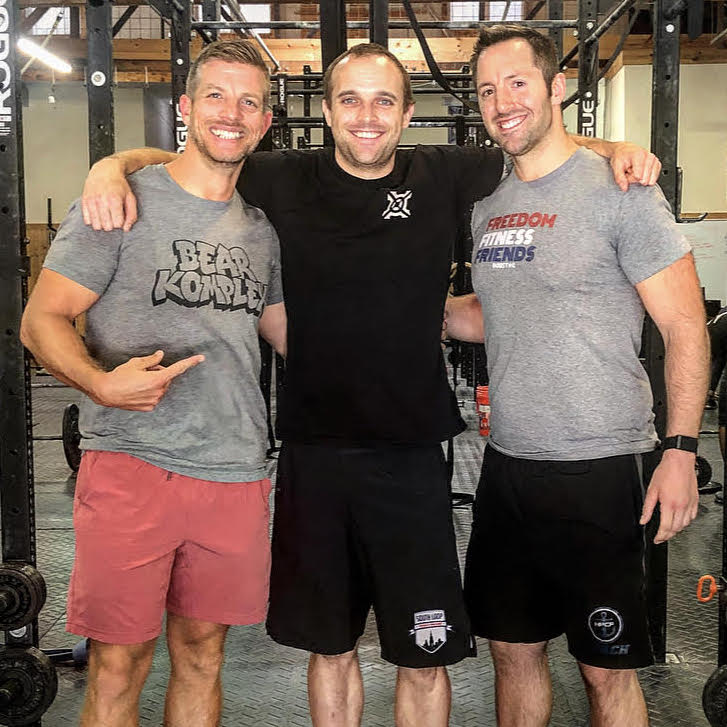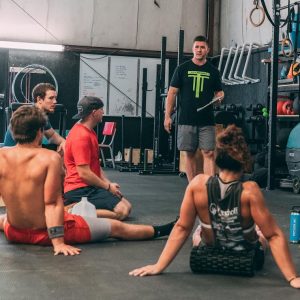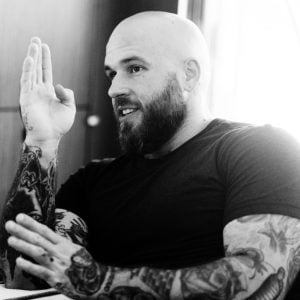We’ve got Jake Rhodes from BearKompleX and Jason Yule from Boxstar Apparel and Harbor Park CrossFit on the podcast.
I met both of these fellows when they exhibited at the inaugural South Loop Games in 2016.
This episode isn’t just for CrossFit geeks, since we dig into the ways that Jake and Jason think about building a market for their businesses in a complicated and dynamic fitness landscape.
The nuances of balancing promoting competitive CrossFit and whether that detracts from the mission of health and wellness is tricky to unpack, and Jason and Jake have some interesting perspectives from working with every day people in CrossFit affiliates as well as being involved with sponsoring high level athletes and the CrossFit Games themselves.
Check out the full conversation below to learn:
- How to balance a complicated marketplace where some people are intimidated by elite athletes and others are inspired by elite athletes – and how to find the sweetspot for different business models
- How to make sure your business isn’t just a vanity project – and how to figure out how to actually solve problems for people and lean into those problems when you find them
- What Jason and Jake think of the new Sanctionals structure – and how they plan to make the new structure work for them and their business models
Check out the episode at the links below. If you enjoyed the episode, the best way to support the show is to share with your friends, so send them a link.
Listen Here
- iTunes
- Overcast
- Google Play
- mp3
- Or stream here:
- If you’re enjoying the show, why not a leave a review? It makes a difference in terms of other people finding the show.
Check out more from Jason, Boxstar and Harbor Park CrossFit here:
- Website: www.boxstarapparel.com | www.harborparkcrossfit.com
- Instagram: @jasonjyule | @boxstarapparel | @harborparkcrossfit
Check out more from Jake & BearKompleX here:
- Instagram: @bearkomplex
- Website: www.bearkomplex.com
Show Notes:
- [1:37] Jason’s feelings toward Wisconsin always being paired with some sort of nod to cheese – particularly within the CrossFit Games.
- [4:03] Marketing in the CrossFit world must find balance between the mission of improving health and wellness for those who feel intimidated by the sport, and the showcasing of ‘freaks’ doing muscle ups and handstand walking. By focusing on the elite athletes in the sport, folks who are curious to try CrossFit can be intimidated and put off from going to the gym.
- [11:10] CrossFit is its affiliates, not its one weekend each year where the best athletes perform. There’s a place for showcasing the sport’s best athletes, but stepping away from making those people the whole CrossFit image is important in recruitment of more ‘everyday’ people.
- [15:24] Businesses need to figure out how to retain customers – BearKompleX can’t only target those who are ripping their hands for the first time forever, and the focus begins to shift more toward high-level athletes as the business progresses.
- [17:53] People view elite athletes as role models – people who they strive to be like, whose gear choices influence their own gear choices, etc. It grants companies credibility to have the support of high-level athletes. Those who are newer to CrossFit had to see an ad in their box or a cool video (with a high-level athlete as the face of the brand) and want to improve their athletic ability through gear to buy product, though. As time goes on, Jason and Jake have moved their companies away from focusing on the over-saturated elite athlete field and instead toward focusing on the average athletes who are influencers within their specific CrossFit community.
- [29:00] The goal of being able to compete in the sport of CrossFit is more attainable now, whereas competing at Regionals was previously the goal of the most elite athletes. The changes to the Games structure have affected athletes immensely – they have to be able to handle unpredictability as a piece of the ultimate test, along with the fact that they could devote their lives to CrossFit just to fly across the world and run 400m.
- [37:45] Will someone like Brent Fikowski struggle to compete with the new structure of early cuts at the CrossFit Games? One bad workout can send athletes home early, and it makes it more challenging for outliers in body size to compete in the sport. And why is the stereotypical elite CrossFit athlete so different than the stereotypical elite athlete in other sports?
- [45:14] Jason and Jake’s companies have to establish strategic marketing plans. Placement at events is significant (years ago, they hustled for a main vendor spot at the South Loop Games), along with having the resources to now have representation at sanctionals worldwide.
- [53:44] The vendor floor is very saturated and companies struggle to break even with giving away free gear on top of paying a high price to have a spot at events.
- [57:47] Online traffic spikes for a few weeks after a company is present at an event, which could be due to spectators returning to their boxes and showing off their new gear. Giving out discounts doesn’t produce much increase in purchasing but the chance of having referrals in the future makes it worth it.
- [1:03.58] Priorities change as the Games structure changes – global expansion tactics, prize giveaways with partnerships, and continuing to find further affiliate retail space is essential. Successful worldwide representation is a struggle, but having affiliate owners get on board with carrying gear in their boxes is as well.
- [1:15.11] More on Jason and Jake: social media accounts, opinions on quality Wisconsin beer, and the story behind BearKompleX’s name.
Links and Resources Mentioned
- Mathew Fraser
- Rich Froning
- Tia-Clair Toomey
- Greg Glassman on Pursuing Health with Julie Foucher
- Nick Urankar
- Noah Ohlsen
- Dylan Martin
- Streat Hoerner
- FitAid
- Kill Cliff
- WODprep
- Granite Games
- Wodapalooza
- Patrick Vellner
- Brent Fikowski
- Dave Castro
- Josh Bridges
- Ben Smith
- Rory Mckernan
- Dre Strohm
- Ron Dayne
- Michael Jordan
- Kobe Bryant
- Rogue Invitational
- Challenge Me App
- Spotted Cow






